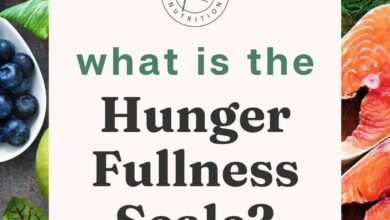7 Signs of Bad Gut Health, According to RDs

Two dietitians pinpoint the most common signs of bad gut health. Even better, they share their top tips to remedy each symptom so you can get your gut and greater health in fighting shape.
Are your cravings out of control? Is your skin excessively prone to breakouts? Do you feel a bit worse for wear after eating? If any (or all) of these scenarios sound familiar, you may be surprised to learn that they share a key commonality: They’re telltale symptoms of poor gut health.
There are countless ways your gut is trying to tell you it needs some extra support; you just need to understand its cues. Keep reading to discover how to tell if you have bad gut health—and more importantly, how to fix it.
7 Signs and Symptoms of Bad Gut Health
1. You feel nauseous if you go too long without eating
For some of us, going too long without eating can result in hanger. For others, it can manifest in the form of nausea, as stomach acid can build up and ultimately cause discomfort, explains Brooklyn-based dietitian Maddie Pasquariello, MS, RDN. “Feeling nauseous can be a sign that you should’ve eaten a meal a bit sooner or had a snack to tide you over.”
Tip: Keep a food diary. Log when you eat your meals and any symptoms that arise, “including nausea but also feelings related to satiety and fullness, especially right after a meal,” Pasquariello advises. Armed with this info, you can begin to notice key trends and triggers that may be sabotaging your gut. For this symptom, “I also often recommend switching up your intake to try eating five small meals rather than three larger ones,” she adds.
2. You feel bloated after a meal
Pasquariello notes that bloating is normal and that we’re all likely to experience it from time to time. However, it’s a major warning sign of bad gut health if it causes distress all too often after you eat. A few key causes of bloating, she shares, are:
- Eating too fast
- Not chewing enough
- Drinking too many fluids with your meal
- Not being present while eating
Tip: Practice mindful eating. “To help minimize some of the typical bloating you may feel after a meal, I recommend setting your fork down between bites and trying to chew each bite for at least 10 to 20 chews, as this can help you better tune into your body’s fullness cues as well as prevent bloating,” the dietitian suggests. Research suggests that the ideal number of chews may even be 32, 35, or 40. That said, the primary goal here is to eat mindfully and slowly, which can help you beat the bloat and feel more comfortable during and after mealtime. You may also want to keep digestive enzymes on hand, such as HUM’s Flatter Me, to help break down food and manage bloating.
3. You’re always constipated
According to a 2019 review, gut dysbiosis can contribute to constipation. So if you’re backed up more often than not, or not as *regular* as you’d like to be, know that these are strong signs of bad gut health.
Tip: Get your fix of prebiotics and probiotics. The review above notes that prebiotics (which you can find in fiber-rich foods) and probiotics can combat gut dysbiosis, ultimately leading to less constipation and more frequent BMs. To rev up your intake of prebiotic fiber, Pasquariello suggests adding an extra serving of fruits, veggies, whole grains, or beans to one of your meals daily. Just remember to go slow and steady. “Don’t increase your fiber too much too quickly, or you’ll experience discomfort,” she warns. Also be sure to up your water intake to get things moving along.
Moreover, the same review mentions that many study participants struggling with consistent constipation had lower amounts of Bifidobacteria in their fecal samples, “although no clear consensus exists” to date. At any rate, a probiotic that includes Bifidobacteria strains, like HUM’s Gut Instinct, can amp up their presence and help regulate microbiome diversity.
4. You constantly crave sugar
Some of us were born with a sweet tooth, but sometimes the urge to satisfy your sugar cravings signals poor gut health. “Research shows that the absence of some gut bacteria may lead to an increase in sugar cravings,” explains Amy Shapiro, MS, RD, of Real Nutrition in NYC. She notes that this is common in people after they take antibiotics, as they kill off both bad and good bacteria.
Tip: Boost your gut with probiotic foods and/or supplements. To up your intake of probiotics through diet, consider shopping for the likes of kimchi, sauerkraut, and Greek yogurt. They’re satisfying to eat and pack plenty of good bacteria—two perks that can result in fewer cravings for sugary sweets and treats. Also, Shapiro notes that Lactobacillus acidophilus is a particularly important strain that can help replenish your microbiome.
5. You have new food sensitivities and/or nutrient deficiencies
“Many people don’t realize they are not absorbing nutrition from their food, which can be due to poor absorption in the gut,” Shapiro shares. She says the same goes if you have a food allergy or intolerance. (Pasquariello adds that these conditions can contribute to diarrhea and cramping, which are additional symptoms of bad gut health.) However, new or recent reactivity to certain foods may very well circle back to adverse changes in the gut. “Gut dysbiosis likely precedes the development of food allergy, and the timing of such dysbiosis is critical,” states one 2019 review.
If your gut microbiome is in poor shape, there’s a good chance “you’ll see iron or calcium deficiencies come up in blood work,” Shapiro continues. If you haven’t gotten a panel recently, symptoms of inadequate iron levels include fatigue and hair loss. Symptoms of calcium insufficiency may be less obvious to detect, yet they include but aren’t limited to muscle cramps, confusion, and dry skin.
Tip: Consult a doctor or dietitian to get to the root of the problem. If you’re not sure which foods are problematic for you, you’ll want to seek personalized tested and advice from an expert. Shapiro says you’ll need to remove foods that are flattening your villi (small projections in the small intestine that absorb nutrients from what you eat). In addition, she advises supplementing with the nutrients you lack until your levels are back to normal. A multivitamin like HUM’s Base Control, which offers 22 vitamins and minerals, can help cover some of these gaps.
6. Your skin is breaking out
ICYMI, the gut-skin axis is real. That said, one telltale sign that neither your gut nor your skin are functioning optimally is the presence of breakouts. As one 2019 study summarizes, “It is now clear that intestinal microbes have significant effects on acne.”
Tip: Supplement with probiotic strains that support clear skin. HUM’s Skin Squad packs nine probiotic strains that are clinically demonstrated to help balance the gut microbiome, support a reduction in breakouts, and promote an even skin tone. But that’s not all: It’s also formulated with prebiotic konjac root to feed good gut bacteria while supporting skin clarity.
7. Your mood and energy are low
“Poor gut health can lead to low energy, headaches, and brain fog, which can impact your mood and nervous system,” Shapiro explains. Gut imbalances can also lead to a reduction in serotonin levels, as the majority of this all-important neurotransmitter for mental health is secreted in the gut. Shapiro adds that a leaky gut could also be at play.
Tip: Modify your diet. In addition to taking a probiotic, Shapiro advises eating a high-fiber, low-sugar diet—with minimal processed and inflammatory foods—to help promote the growth of good gut bacteria. Moreover, she suggests adding collagen-rich bone broth to your rotation, which can help improve the gut lining.
Source link
#Signs #Bad #Gut #Health #RDs



